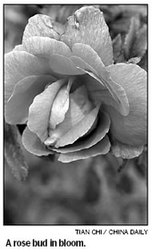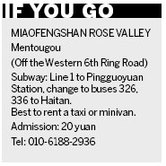


Beijing
You can smell the roses as the mountain breezes cool off the city heat off your back. The climb up to Miaofengshan's famous Rose Valley may be long and winding but persevere, and you'll soon be rewarded with the scent of a thousand blooms.
The roses have been on the mountain for at least a thousand years, the farmers tell us. And the rose-petal jam made here was sent into the Forbidden City as tribute to the Empress Dowager, who was especially fond of little pastries made with the conserve.
A weekend trip here is a cool retreat. Up at that altitude, you can leave the oppressive city heat behind and enjoy lower temperatures 1,300 meters above sea level. Start off early in the morning to avoid peak traffic. It's only about an-hour-and-a-half's drive from the city center into the western suburbs of Mentougou.
At the foot of the hills, you have to stop and pay an entrance fee, but once that little inconvenience is overcome, you can sit back and enjoy the scenery.

By the time you get to the fork in the road that points the way to Rose Valley at Jiangou village, stop for lunch at one of the farmhouse restaurants. They sell a baked trout here that's very good, and lots of healthy vegetable dishes that come fresh from the back plots. Don't miss the rose bud fritters, which are crisp introductions to the flowers found here.
The Rosa chinensis species has been growing on the mountain longer than anyone can remember. Farmers and monks living in the temples on Miaofengshan have long cultivated these wild fragrant roses, and they named it jinding or Golden Pinnacle.
Apart from the famous rose-petal jam, there is also a small factory that extracts essential oil through a distillation process. The oil is not cheap, because it takes 5 tons of flowers to get 3 kg of oil - which translates to three big truckloads of flowers condensed into two 1.5-liter bottles. It lives up to its name by being more expensive than gold.
You can contact the writer at paulined@chinadaily.com.cn
China Daily
(China Daily 06/26/2011 page15)